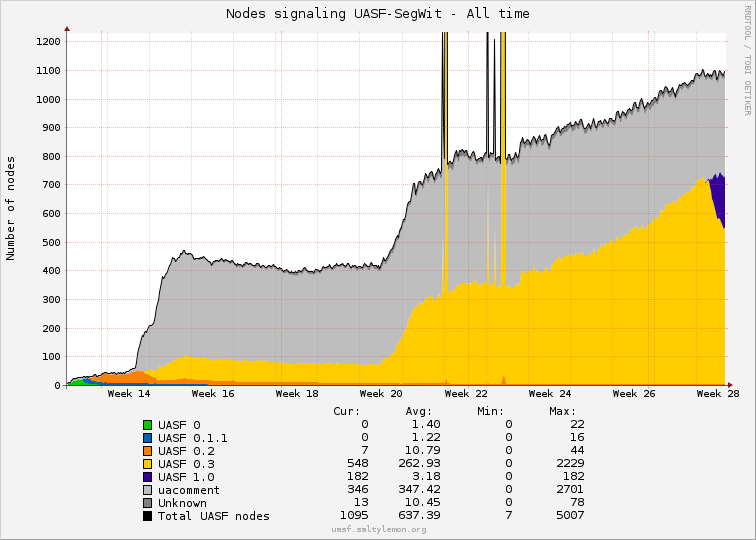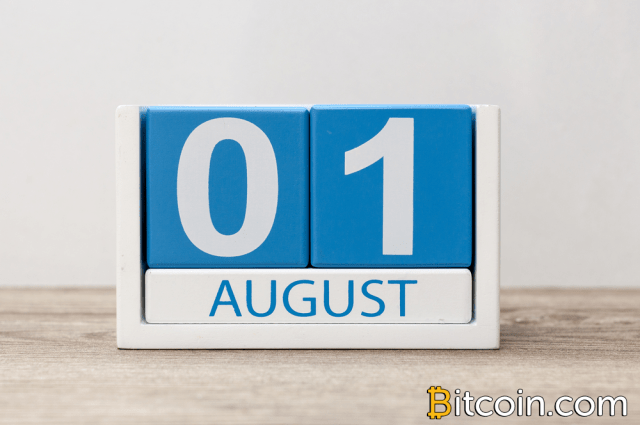If you’ve been listening to the bitcoin ‘community,’ you’d know in about two weeks the bitcoin network may face some protocol changes. Due to the possible user-activated soft fork (UASF) planned and the chance some groups may counter this plan, this has created thousands of discussions concerning August 1. Now the bitcoin-focused web portal Bitcoin.org has issued a warning on the site that informs users of a “potential network disruption.”
Also read: Mining, Merchants, and Traders—Thailand’s Got the Bitcoin Fever
August 1st and the Potential Network Disruption
Bitcoin users everywhere are getting prepared and heavily discussing the possibility of a blockchain split. The subject was discussed a lot this past March when bitcoin proponents and cryptocurrency businesses feared a potential split when the Bitcoin Unlimited implementation was seeing strong support. Now the conversation has resurfaced, but the topic of UASF or BIP148 is an entirely different scenario.

UASF (BIP148) is a mechanism designed to start on August 1st, at 00:00 UTC that activates a soft fork enforced by full nodes. After this point, full nodes participating in this plan will reject blocks that have not upgraded to BIP141 otherwise known as Segregated Witness (Segwit). At press time there are 1095 total UASF nodes out of 7896 reachable bitcoin nodes globally according to Bitnodes. UASF requires a lot of industry support and miners to activate Segwit, by this point if they do not support the activation the chain could diverge into two.

Currently, there are businesses that have announced initial support for BIP148 such as Abra, Trezor, Samourai Wallet, Electrum, Coinomi, Mycelium and roughly 37 other organizations. However, there are many wallets and a vast majority of exchanges that have not announced any support or issued warnings about the upcoming August 1st Segwit enforcement. This includes a significant amount of wallet providers and exchanges including Bitstamp, Kraken, Bitfinex, Gemini, BTCC, Poloniex, and many more. One relatively small exchange in Switzerland called Bity has warned its customers the platform will be halting trading on August 1st.
Bitcoin.org’s Warning
On Wednesday, July 12, 2017, 08:00:00 GMT Bitcoin.org issued a warning in regards to the potential network disruption that may take place on July 31, 20:00:00 GMT/August 1st, 00:00 UTC.
“Bitcoin confirmation scores may become unreliable for an unknown length of time,” explains the network disruption warning. “This means that any bitcoins you receive after that time may later disappear from your wallet or be a type of bitcoin that other people will not accept as payment.”
Once the situation is resolved, confirmation scores will either automatically return to their normal reliability, or there will be two (or more) competing versions of Bitcoin. In the former case, you may return to using Bitcoin normally; in the later case, you will need to take extra steps in order to begin safely receiving bitcoins again.

The warning gives users some preparation guidelines and possible outcomes for during and after the UASF event. This includes not trusting payments during this time, and not sending payments until after the dust has settled. Even the maintainer of the website Bitcoinuptime.com says that there may be “potential bitcoin downtime from the upcoming BIP148 fork” and the network’s 99.991523267% uptime will have to be updated. Further, there was an issue concerning the Bitcoin.org alert over the wording “Bitcoin may be unsafe to use starting July 31st” in contrast to saying “potential network disruption.” The developer who made the change writes;
Note: I object to this change, which I think makes the alert less clear, less forceful, and degrades alert usability. I make this change only because the Bitcoin.org site maintainer insists upon it.
GDAX Issues a Statement Concerning UASF
Following Bitcoin.org’s disruption alert one large bitcoin exchange has come forward issuing a warning and how the company will handle the August 1 situation. The cryptocurrency trading platform GDAX, a subset of Coinbase announced there will be a temporary suspension of deposits, withdrawals, and possibly trading on August 1. GDAX executive Adam White says, “the activation of UASF may create two blockchains,” and outlines how the company plans on handling the possible fork. If August 1 results in two chains, GDAX states;
- One blockchain becomes dominant, resulting in the other blockchain having low community adoption and value.
- Both blockchains are adopted, co-existing and operating independently of one another with roughly equal community adoption and value.
In either scenario, we will implement safeguards to ensure the safety of our customers’ funds. For example, we will temporarily suspend the deposit and withdrawal of bitcoin on GDAX and may pause the trading of bitcoin as well. This decision will be based on our assessment of the technical risks posed by the fork, such as replay attacks and other factors that could create network instability.
Bitcoin ABC
Another possible scenario to think about is the “Bitcoin ABC” (Adjustable Blocksize Cap) implementation that was revealed by the software engineer, Amaury Séchet at The Future of Bitcoin event in Arnhem. The project has released its latest client Bitcoin ABC 0.14.2 and says it’s a full node implementation of Bitcoin that removes Segwit code and replaces it with an adjustable block size cap. During the initial announcement, Séchet detailed that Bitcoin ABC is part of the user-activated hard fork contingency plan against BIP148.

In essence, the ABC protocol prepares for any disruptive risks associated with UASF activation and could also activate during the August 1st “Flag Day” as well. Besides being a contingency plan, the UAHF protocol will move the block size cap towards the activation of emergent consensus where users can decide block size themselves. Bitcoin ABC could counter the BIP148 soft fork which could cause network disruption, and a possible blockchain split as well.
Meanwhile, the Segwit2x Plan Moves Forward In the Midst of Egos and Constant Bickering
Alongside these two alternative plans, the Segwit2x working group has also been steadily preparing the compromise idea announced called the “New York Agreement.” The group released beta code and have been experimenting with the Segwit protocol and a 2MB hard fork on a Bitcoin testnet. So far there has been a lot of bickering about Segwit2x between the project’s lead developer Jeff Garzik, Bitcoin core developers, and the Blockstream CEO Adam Back. Many core supporters refuse to compromise on Segwit2x calling it “Franken-segwit” and a great majority of core developers have rejected supporting the idea. However, some core maintainers have been making comments on Segwit2x’s Github and the working group’s Slack channel. There is still uncertainty concerning the New York Agreement plan, but the working group is still moving along as August 1st gets closer.
As far as August 1st is concerned users should make sure they hold their private keys. There is a possibility of network disruption and Bitcoin.com will inform our readers of everything people need to know, including exchange updates, trading, withdrawal and deposit suspensions, and any other important information that arises in regards to this specific date.
What do you think about August 1st? Do you think there will be any potential network disruption or do you think nothing will happen at all? Let us know what you think in the comments below.
Images via Shutterstock, Pixabay, Saltylemon.org, Bitcoin.org, and Bitcoin ABC.
Show the world how cutting-edge you are with a bitcoin T-shirt, hoodie, bag, key-ring, even a Trezor hardware wallet. Shipping all over the world, quality merchandise and, of course, a payment system that makes people say “wow!”










